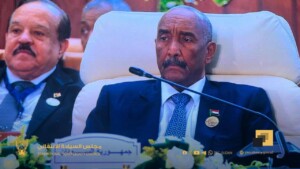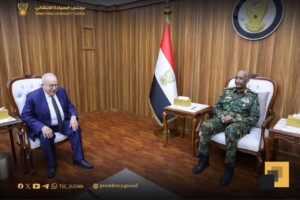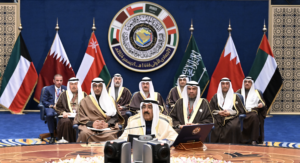‘Sudan’s national dialogue to resume after Ramadan’: NCP
The ruling National Congress Party (NCP) has presented new proposals to accelerate the national dialogue process, as proposed by President Al Bashir in January 2014 to resolve the crises in the country.
Mustafa Osman Ismail, head of the NCP Political Bureau, told the government-linked Sudan Media Center (SMC) on Saturday that his party would soon submit those proposals to the dialogue coordinating committee, known as the 7+7 mechanism, without elaborating on the contents, Sudan Tribune reported on Saturday.
The ruling National Congress Party (NCP) has presented new proposals to accelerate the national dialogue process, as proposed by President Al Bashir in January 2014 to resolve the crises in the country.
Mustafa Osman Ismail, head of the NCP Political Bureau, told the government-linked Sudan Media Center (SMC) on Saturday that his party would soon submit those proposals to the dialogue coordinating committee, known as the 7+7 mechanism, without elaborating on the contents, Sudan Tribune reported on Saturday.
The NCP leadership has approved the proposals and requested to turn them into a work programme that will accommodate all political parties participating in the dialogue, which is planned, Ismail said, to be resumed after Ramadan.
He repeated his party’s stance that all political forces are welcome to participate in the dialogue including the rebel movements, but stressed the NCP’s refusal to hold the dialogue outside Sudan.
All opposition parties, however, stress that a conducive environment should be created before the launch of a broad national dialogue, by restoration of civic freedoms, the ending of the wars in the country, and the release of political detainees and prisoners.
The National Umma Party, headed by El Sadig El Mahdi, and the Reform Now Movement (RNM), established by NCP dissident Ghazi Salaheldin El Atabani in December 2013, suspended their participation in the dialogue process last year, stating that the ruling party is not serious about reaching peace and implementing democratic reforms.
Opposition
The NCP declined to participate in a pre-dialogue meeting called for by the AU mediation team, the AU High-level Implementation Panel (AUHIP) in Addis Ababa on 29 March, together with the opposition forces allied by the Sudan Appeal. The ruling party argued that any meeting on the dialogue should take place within the country, and that the timing was not appropriate, as the election would start two weeks later.
The opposition forces, represented by the Sudan Revolutionary Front (SRF, an alliance of the main rebel movements), the National Umma Party (NUP), the National Consensus Forces (NCF, a coalition of opposition parties), and the Civil society Initiative (CSI) signed the Sudan Appeal document in the Ethiopian capital on 3 December last year, in which they refuse separate peace talks on Darfur and the Two Areas (South Kordofan and Blue Nile states), a process Khartoum is insisting on.
The two-page political communiqué further calls for the dismantling of the one-party system and the rebuilding of Sudan based on democratic principles and equal citizenship. The signatories agreed that if a peaceful regime-change cannot be achieved by a broad national dialogue, it should be enforced by a popular uprising.
NCF leader Faroug Abu Eisa, and CSI chairman Dr Amin Mekki Madani were detained by security officers in Khartoum on 6 December, a day after their return from Addis Ababa. They were charged of instigating violence against the state and violating the Constitution, but were suddenly released on 9 March, a month before the general election would commence.
During the last week of February, the Sudan Appeal signatories met in the German capital, where they agreed on a joint position paper that became known as the Berlin Declaration, on the contents, place and time of a preparatory National Dialogue meeting that, they stressed, should be facilitated by the AUHIP.
The Sudan Appeal forces continued lobbying among members of the international community. On 9 June, a delegation of the Sudanese opposition briefed EU legislators in Strasbourg on the situation in Sudan, calling for support to realise peace in the war-torn country.
Comprehensive dialogue process
In the EU parliamentary hearing entitled “Sudan’s recent election and peace perspectives”, Malik Agar, SRF chairman and El Sadig El Mahdi, head of the NUP, called for support of the development of a new, inclusive and comprehensive peace and dialogue process, to be brokered by the AUHIP, headed by former South-African President Thabo Mbeki.
During a meeting with international Special Envoys to Sudan in Paris on 10 June, the opposition forces stressed the importance of adopting a nationwide basis for the Sudanese peace talks.
The bases for the past peace negotiations are no longer appropriate, regarding the developments in Sudan, NUP leader El Sadig El Mahdi told Radio Dabanga at the time.
“The proposed new mandate for a broad national dialogue should replace the 2011 Doha Document for Peace in Darfur and the peace negotiations on South Kordofan and the Blue Nile,” he said. “It should be filed to the UN Security Council, to be adopted under Chapter VII, as a substitute for the separate peace talks Khartoum continues to insist on.
“This is the only way,” El Mahdi stressed, “to compel the Sudanese government to return to the negotiating table. The arrogant Khartoum regime will only respond to calls for a dialogue after being pressured, both by the international community and a strong internal unity.”











 and then
and then